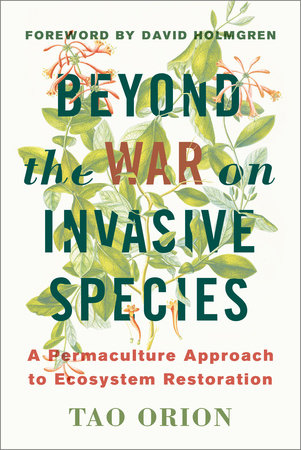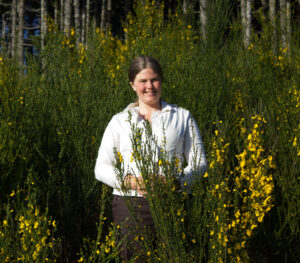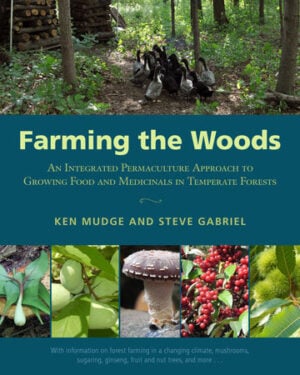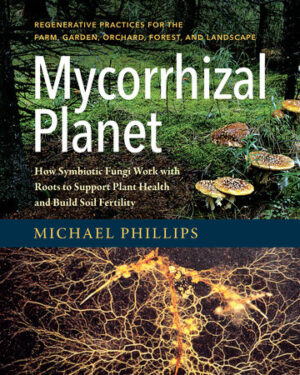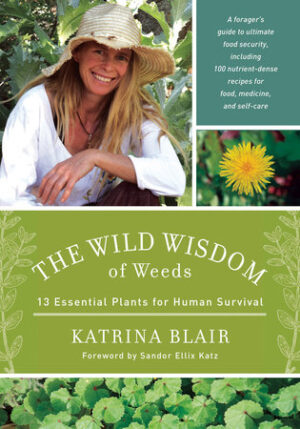EXCERPTS
| Pages: | 272 pages |
| Size: | 6 x 9 inch |
| Publisher: | Chelsea Green Publishing |
| Pub. Date: | June 19, 2015 |
| ISBN: | 9781603585637 |
Beyond the War on Invasive Species
A Permaculture Approach to Ecosystem Restoration
Paperback
$22.95
Invasive species are everywhere, from forests and prairies to mountaintops and river mouths. Their rampant nature and sheer numbers appear to overtake fragile native species and forever change the ecosystems that they depend on.
Concerns that invasive species represent significant threats to global biodiversity and ecological integrity permeate conversations from schoolrooms to board rooms, and concerned citizens grapple with how to rapidly and efficiently manage their populations. These worries have culminated in an ongoing “war on invasive species,” where the arsenal is stocked with bulldozers, chainsaws, and herbicides put to the task of their immediate eradication. In Hawaii, mangrove trees (Avicennia spp.) are sprayed with glyphosate and left to decompose on the sandy shorelines where they grow, and in Washington, helicopters apply the herbicide Imazapyr to smooth cordgrass (Spartina alterniflora) growing in estuaries. The “war on invasive species” is in full swing, but given the scope of such potentially dangerous and ecologically degrading eradication practices, it is necessary to question the very nature of the battle.
Beyond the War on Invasive Species offers a much-needed alternative perspective on invasive species and the best practices for their management based on a holistic, permaculture-inspired framework. Utilizing the latest research and thinking on the changing nature of ecological systems, Beyond the War on Invasive Species closely examines the factors that are largely missing from the common conceptions of invasive species, including how the colliding effects of climate change, habitat destruction, and changes in land use and management contribute to their proliferation.
There is more to the story of invasive species than is commonly conceived, and Beyond the War on Invasive Species offers ways of understanding their presence and ecosystem effects in order to make more ecologically responsible choices in land restoration and biodiversity conservation that address the root of the invasion phenomenon. The choices we make on a daily basis—the ways we procure food, shelter, water, medicine, and transportation—are the major drivers of contemporary changes in ecosystem structure and function; therefore, deep and long-lasting ecological restoration outcomes will come not just from eliminating invasive species, but through conscientious redesign of these production systems.
“Beyond the War on Invasive Species is a devastating exposé of the military industrial invasive species complex and a sorely needed and impeccably researched volume that should become one of many as we recover from self-destructive attempts to eradicate parts of nature instead of acting with an understanding of the whole.”—Ben Falk, author of The Resilient Farm and Homestead and founder of Whole Systems Design
Reviews & Praise
"Here is a brilliant, alternative way of dealing with nonnative, invasive species. Oregon State University permaculturist Orion’s emphasis is on plants, and her survey of relevant literature is a virtuoso incorporation of books, journals, electronic resources, and personal communications, written in commendable expository prose. In the face of overwhelming political correctness, which dictates that invasive species should be eliminated, the author offers ways to exploit and adapt to them in addition to extolling the virtues some of the species exhibit. As an instructor, Orion teaches ways to manage ecosystems with an eye to long-term results, free of herbicides and destructive attempts to remove species seen as undesirable. She pays special attention to the behaviors of ‘primitive' societies in relation to their surroundings. In her view, pre-Columbian America was already far from pristine; it underwent many changes wrought by Native Americans, especially through fire. This thoughtful, controversial, and well-documented book is guaranteed to infuriate many and to provoke us into rethinking our attitudes about what is natural and best for the land. With essays such as 'The Myth of Wilderness,' the reader is challenged to confront revolutionary ideas about our landscapes. VERDICT: Ideal for all interested in natural history, agriculture, chemicals, climate change, ecology, and anthropology.”—Library Journal, Starred Review
"Ecosystem restoration, broadly defined as reinstating native flora and fauna by controlling invasive species, is a noble goal. But in the case of plants, it is often achieved through the use of harsh pesticides. This irony is not lost on botanist Orion, who encourages fellow environmental professionals to factor in the larger picture and “turn on the macroscope” to meet desired end goals. Systematically pointing out avenues for improvement in our approach to restoration, from consuming more local foods to changing how we work with “pristine” nature, Orion provides us with a practical worksheet that takes the permaculture view, a holistic way of looking at habitat. This slender volume might be too “textbookish” to be accessible to the lay reader but Orion’s reminders that the very definition of “native” is in flux (a process exacerbated by climate change) and her eco-friendly suggestions about what to do with “unwanted” species should be essential reading for all. Plenty of real-world instances of invasive flora and fauna (e.g., kudzu, zebra mussels) make the case effectively.”—Booklist
“Some of our most productive and tasty plants in the permaculture landscape are vilified as invasive weeds that need controlling. This is a mindset that also promotes a delineation between conservation and agriculture. My personal response is to cultivate fewer conventional annual vegetables and grow and eat as many of these weeds as is appropriate, creating an extensive, diverse, and resilient forage system in my own backyard. It is time to stop putting land management into boxes and create wildlife habitats and food in stacked systems.
"Tao Orion explains how to take advantage of the vigor of ‘invasive’ edible and useful exotics and harvest them. This is how to bring ecosystems back into balance. This is adaptive permaculture thinking at the broad-scale level. Chelsea Green has produced yet another pioneering book, demonstrating how permaculture is way ahead of conventional land-management practices.”—Maddy Harland, editor of Permaculture magazine, cofounder of The Sustainability Centre in the UK, and a Fellow of the Royal Society of Arts
“An interesting and valuable contribution to the ongoing refutation of invasive species ideology. Detailed and wide-ranging, Orion extends and deepens several analyses of invasionism, and offers several interesting new perspectives. She points to holistic systems management as an alternative to the current war on invasives. Land managers and invasionists would do well to give it a careful read.”—D.I. Theodoropoulos, author of Invasion Biology: Critique of a Pseudoscience
“Beyond the War on Invasive Species creates an essential pathway for deeper care of the Earth. The holistic perspective of invasives is shared through deep experience and thoughtfulness and ultimately leads us to a greater and more aligned role in restoration of our home’s ecosystems in these changing times. This book offers a critical role in civilization’s evolution and highlights actions that recognize deeper values that benefit our society as a whole.”—Katrina Blair, author of The Wild Wisdom of Weeds: 13 Essential Plants for Human Survival
“In her fascinating and highly readable book, Beyond the War on Invasive Species, author Tao Orion points out the shortcomings of our current approach toward landscape restoration and invasive species. Rather than seeing these exotic plants and animals simply as invaders that need to be eradicated, she argues, we should recognize the beneficial role they play in the environment and the many essential services they could provide to human beings. “Embracing rampancy,” as Orion exuberantly puts it, turns the perceived problem of invasive species into practical solutions that also allow us to make peace with both the land and ourselves.”—Larry Korn, author of One-Straw Revolutionary: The Philosophy and Work of Masanobu Fukuoka
“This book brings much-needed balance to the overheated debate about so-called invasive species. Tao Orion’s meticulously researched yet engaging work shows that the true culprits are nearly always human-caused disturbance and development, and that species shifts are a symptom, not a cause, of this habitat destruction. Beyond the War on Invasive Species is an important book that offers a path away from unsuccessful restoration efforts—based on poor science and policy—and toward new, ecologically sound programs for building and preserving biodiversity.”—Toby Hemenway, author of Gaia’s Garden: A Guide to Home-Scale Permaculture and The Permaculture City: Regenerative Design for Urban, Suburban, and Town Resilience
“Beyond the War on Invasive Species is part of a new, much more nuanced conversation about ‘invasive’ species that is taking place in science, agriculture, and land management. It provides an analysis of the new science that looks for ecosystem function as well as harm from newly arrived species, looks at species migration in the context of climate change, and broadens our conversation to look at these organisms in the context of the human ecological footprint. Orion offers land management guidelines, based in permaculture design process, that help to chart a new way forward in our new land of novel ecosystems.”—Eric Toensmeier, author of Paradise Lot and Perennial Vegetables
“Tao Orion has brought together personal experience, careful study, and visionary thinking to turn us toward becoming useful people of place. Her exploration widens the narrow concept of invasion (so often repeated but seldom carefully thought through) and elucidates the trouble of short sightedness. We are not threatened by aliens, but rather we are turning our backs on the big picture.”—Tom Ward, author of Greenward, Ho! Herbal Home Remedies and cofounder of Siskiyou Permaculture
“A gathering body of evidence against the scale of chemical interventions in both agriculture and wild nature is fueling a battle of geopolitical proportions. In the process of asking the questions about how best to restore nature, Orion exposes a deep ethical corruption at the heart of both ecological science and the environmental movement.”—David Holmgren, from the Foreword
“Beyond the War on Invasive Species is a devastating exposé of the military industrial invasive species complex and a sorely needed and impeccably researched volume that should become one of many as we recover from self-destructive attempts to eradicate parts of nature instead of acting with an understanding of the whole.”—Ben Falk, author of The Resilient Farm and Homestead and founder of Whole Systems Design


